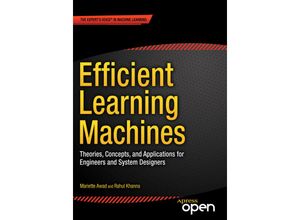Machine learning techniques provide cost-effective alternatives to traditional methods for
extracting underlying relationships between information and data and for predicting future
events by processing existing information to train models. Efficient Learning Machines explores
the major topics of machine learning including knowledge discovery classifications genetic
algorithms neural networking kernel methods and biologically-inspired techniques. Mariette
Awad and Rahul Khanna's synthetic approach weaves together the theoretical exposition design
principles and practical applications of efficient machine learning. Their experiential
emphasis expressed in their close analysis of sample algorithms throughout the book aims to
equip engineers students of engineering and system designers to design and create new and
more efficient machine learning systems. Readers of Efficient Learning Machines will learn how
to recognize and analyze the problems that machine learning technology can solve for them how
to implement and deploy standard solutions to sample problems and how to design new systems
and solutions. Advances in computing performance storage memory unstructured information
retrieval and cloud computing have coevolved with a new generation of machine learning
paradigms and big data analytics which the authors present in the conceptual context of their
traditional precursors. Awad and Khanna explore current developments in the deep learning
techniques of deep neural networks hierarchical temporal memory and cortical algorithms.
Nature suggests sophisticated learning techniques that deploy simple rules to generate highly
intelligent and organized behaviors with adaptive evolutionary and distributed properties.
The authors examine the most popular biologically-inspired algorithms together with a sample
application to distributed datacenter management. They also discuss machine learning techniques
for addressing problems of multi-objective optimization in which solutions in real-world
systems are constrained and evaluated based on how well they perform with respect to multiple
objectives in aggregate. Two chapters on support vector machines and their extensions focus on
recent improvements to the classification and regression techniques at the core of machine
learning.

